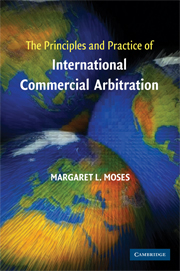Book contents
- Frontmatter
- Contents
- Foreword
- Preface
- 1 Introduction to International Commercial Arbitration
- 2 The Arbitration Agreement
- 3 Drafting the Arbitration Agreement
- 4 Applicable Laws and Rules
- 5 Judicial Assistance for Arbitration
- 6 The Tribunal
- 7 The Arbitral Proceedings
- 8 The Award
- 9 Attempts to Set Aside an Award
- 10 Enforcement of the Award
- 11 Investment Arbitration
- Appendices
- A The United Nations Convention on the Recognition and Enforcement of Foreign Arbitral Awards (The New York Convention) (1958)
- B UNCITRAL Model Law on International Commercial Arbitration (original 1985 version)
- C Annex I: Revised Articles of the UNCITRAL Model Law on International Commercial Arbitration (2006)
- D Annex II: UNCITRAL Recommendation Regarding the Interpretation of Article II, Paragraph 2, and Article VII, Paragraph 1, of the New York Convention
- E IBA Rules on Taking Evidence in International Commercial Arbitration
- F IBA Rules of Ethics for International Arbitrators (1987)
- G IBA Guidelines on Conflicts of Interests in International Arbitration
- H The AAA–ABA Code of Ethics for Arbitrators in Commercial Disputes
- I Model Clauses
- J Useful Arbitration Websites
- Index
F - IBA Rules of Ethics for International Arbitrators (1987)
- Frontmatter
- Contents
- Foreword
- Preface
- 1 Introduction to International Commercial Arbitration
- 2 The Arbitration Agreement
- 3 Drafting the Arbitration Agreement
- 4 Applicable Laws and Rules
- 5 Judicial Assistance for Arbitration
- 6 The Tribunal
- 7 The Arbitral Proceedings
- 8 The Award
- 9 Attempts to Set Aside an Award
- 10 Enforcement of the Award
- 11 Investment Arbitration
- Appendices
- A The United Nations Convention on the Recognition and Enforcement of Foreign Arbitral Awards (The New York Convention) (1958)
- B UNCITRAL Model Law on International Commercial Arbitration (original 1985 version)
- C Annex I: Revised Articles of the UNCITRAL Model Law on International Commercial Arbitration (2006)
- D Annex II: UNCITRAL Recommendation Regarding the Interpretation of Article II, Paragraph 2, and Article VII, Paragraph 1, of the New York Convention
- E IBA Rules on Taking Evidence in International Commercial Arbitration
- F IBA Rules of Ethics for International Arbitrators (1987)
- G IBA Guidelines on Conflicts of Interests in International Arbitration
- H The AAA–ABA Code of Ethics for Arbitrators in Commercial Disputes
- I Model Clauses
- J Useful Arbitration Websites
- Index
Summary
Reprinted with permission of the International Bar Association, London. © International Bar Association, 1987
INTRODUCTORY NOTE
International arbitrators should be impartial, independent, competent, diligent and discreet. These rules seek to establish the manner in which these abstract qualities may be assessed in practice. Rather than rigid rules, they reflect internationally acceptable guidelines developed by practising lawyers from all continents. They will attain their objectives only if they are applied in good faith.
The rules cannot be directly binding either on arbitrators, or on the parties themselves, unless they are adopted by agreement. Whilst the International Bar Association hopes that they will be taken into account in the context of challenges to arbitrators, it is emphasised that these guidelines are not intended to create grounds for the setting aside of awards by national courts.
If parties wish to adopt the rules they may add the following to their arbitration clause or arbitration agreement: “The parties agree that the rules of Ethics for International Arbitrators established by the International Bar Association, in force at the date of the commencement of any arbitration under this clause, shall be applicable to the arbitrators appointed in respect of such arbitration.” The International Bar Association takes the position that (whatever may be the case in domestic arbitration) international arbitrators should in principle be granted immunity from suit under national laws, except in extreme cases of wilful or reckless disregard of their legal obligations.
- Type
- Chapter
- Information
- Publisher: Cambridge University PressPrint publication year: 2008



